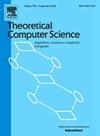The frontier of intractability for EFX with two agents
IF 1
4区 计算机科学
Q3 COMPUTER SCIENCE, THEORY & METHODS
引用次数: 0
Abstract
We consider the problem of sharing a set of indivisible goods among agents in a fair manner, namely such that the allocation is envy-free up to any good (EFX). We focus on the problem of computing an EFX allocation in the two-agent case and characterize the computational complexity of the problem for most well-known valuation classes. We present a simple greedy algorithm that solves the problem when the agent valuations are weakly well-layered, a class which contains gross substitutes and budget-additive valuations. For the next largest valuation class we prove a negative result: the problem is PLS-complete for submodular valuations. All of our results also hold for the setting where there are many agents with identical valuations.
两剂EFX的难解性边界
我们考虑以公平的方式在代理之间共享一组不可分割的商品的问题,即使得分配是无嫉妒的,直到任何商品(EFX)。我们重点研究了在双代理情况下计算EFX分配的问题,并描述了大多数知名估值类问题的计算复杂性。我们提出了一种简单的贪心算法,用于解决代理估值是弱分层的问题,该类包含总替代和预算加性估值。对于下一个最大的估值类别,我们证明了一个负面的结果:问题是pls -完备的子模块估值。我们所有的结果也适用于有许多具有相同估值的代理的情况。
本文章由计算机程序翻译,如有差异,请以英文原文为准。
求助全文
约1分钟内获得全文
求助全文
来源期刊

Theoretical Computer Science
工程技术-计算机:理论方法
CiteScore
2.60
自引率
18.20%
发文量
471
审稿时长
12.6 months
期刊介绍:
Theoretical Computer Science is mathematical and abstract in spirit, but it derives its motivation from practical and everyday computation. Its aim is to understand the nature of computation and, as a consequence of this understanding, provide more efficient methodologies. All papers introducing or studying mathematical, logic and formal concepts and methods are welcome, provided that their motivation is clearly drawn from the field of computing.
 求助内容:
求助内容: 应助结果提醒方式:
应助结果提醒方式:


